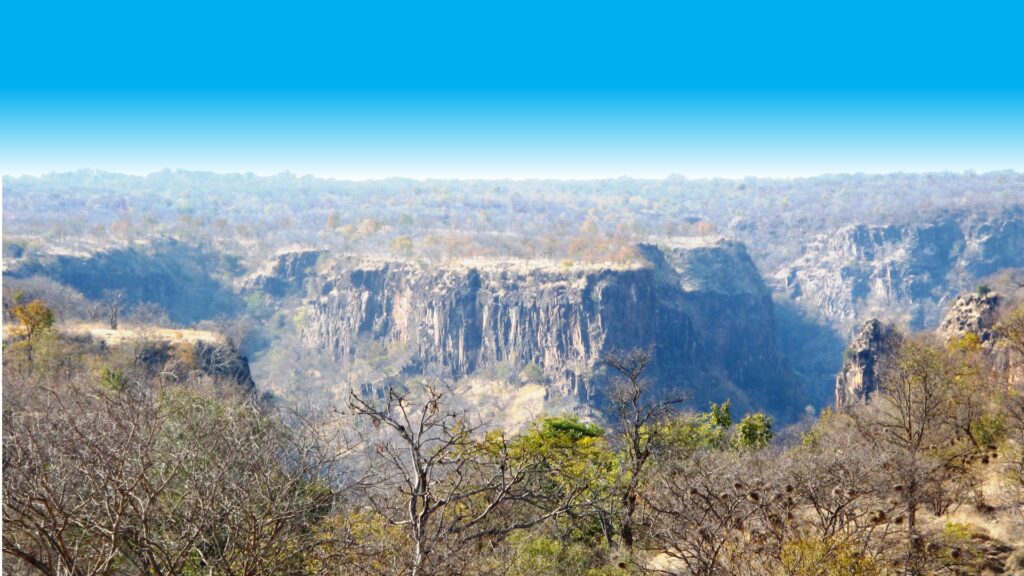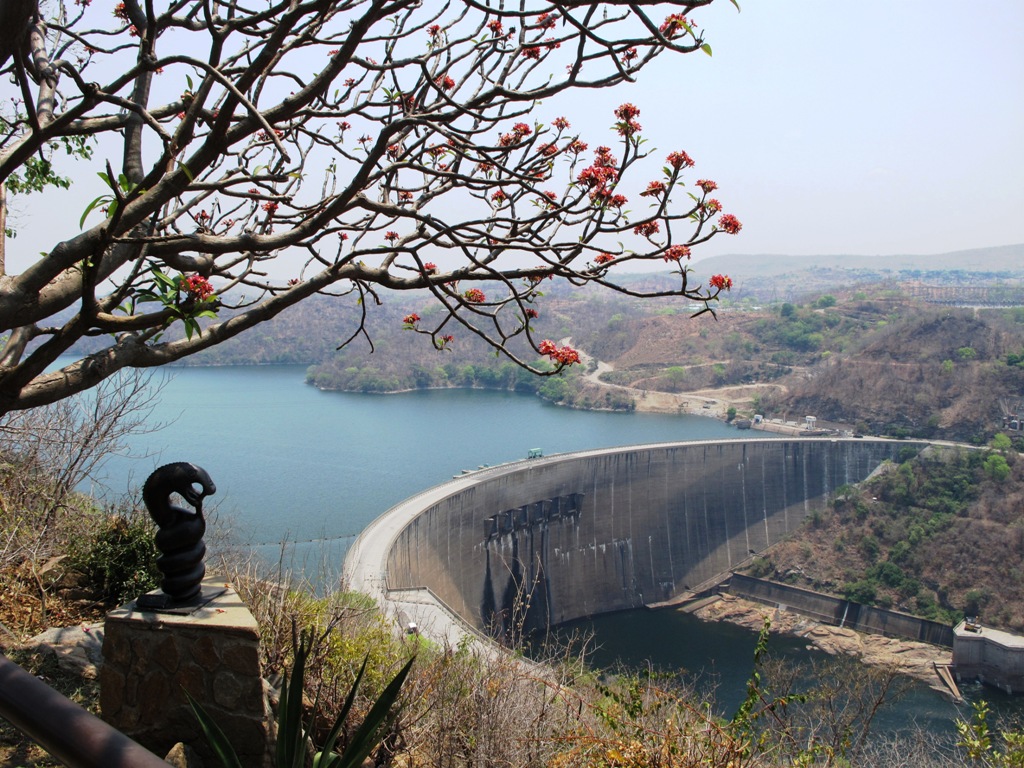 Kariba Gorge was, without doubt, the most physically demanding stretch of the Borderline Walk to date. Before we tackled that daunting obstacle, the debate had involved three areas: the territories flanking the Batoka and Devil’s Gorges and the western half of Chete safari area. Kariba Gorge ended all debate, bringing a new dimension to the party and squeezing more sweat from us than the other three areas combined.
Kariba Gorge was, without doubt, the most physically demanding stretch of the Borderline Walk to date. Before we tackled that daunting obstacle, the debate had involved three areas: the territories flanking the Batoka and Devil’s Gorges and the western half of Chete safari area. Kariba Gorge ended all debate, bringing a new dimension to the party and squeezing more sweat from us than the other three areas combined.
We descended from Kariba town into the gorge during the afternoon of November 3, accompanied by our newfound friend, Mr. Andries Scholtz, who had decided to camp with us that night. Andries is an absolute gentleman who took time from his hectic schedule to guide us around the Kariba area. Since his knowledge of Kariba and its surrounds is vast, it proved to be a most instructive and interesting tour, with the highlight for me being an afternoon on the dam wall. Mind-blowing stuff, to be sure.
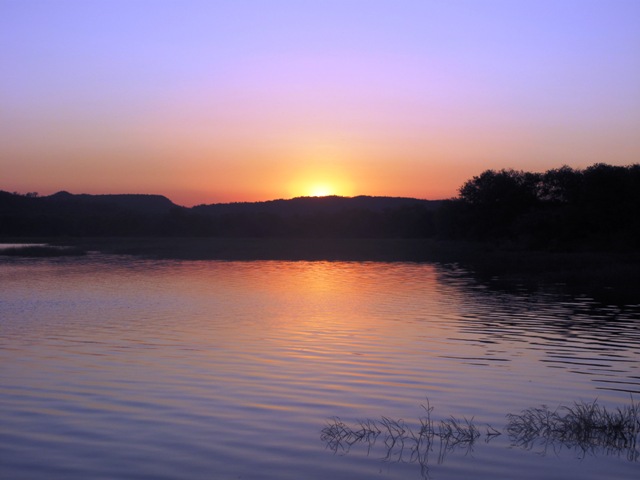
Not that I understand much about the engineering side of it, but one simply has to be in awe of the sheer size of the wall, and appreciate the effort that went into holding the river at bay and putting it all together. A few days before the wall tour, I visited the little chapel erected on Kariba Heights as a memorial to those who died whilst constructing the Kariba dam wall. Eighty-six men in total perished: sixty-five Africans and twenty-one Italians, all between October 7, 1956 and February 15, 1961. Seventeen men were killed on February 2, 1959. I guess that was when a coffer dam burst but don’t quote me on that one. I enjoyed my trip to the chapel atop the heights, but I reckon that the mighty wall itself is a far more fitting tribute to the memory of those brave men. They must have been men of men indeed.
We camped that night beside a river made more stunning than usual by the time of the month and the state of the moon. Before bedding down, some time was spent trying to catch fish and a small crocodile. Both efforts were equally unsuccessful but fun was had and fun is important. At sundown, whilst fishing, we were able to make a fair assessment of what lay ahead the following day. Although the Kariba dam was close to capacity, engineers at the wall were experiencing problems and releasing only a trickle of water. The result, of course, was that the river level was low and I could see how beneficial this would be. As I sat there on the rocks failing to catch fish with Andries and Jephita, gazing off downstream, an expansive smile came to my dial – the ground along the water’s edge seemed manageable enough. In fact, some of it was fairly flat! Of course, there were what looked like a couple of rough spots, but who would expect anything less from any gorge? Suddenly a great deal more optimistic about tackling the gorge than I had been, I stated as much. Andries nodded slowly, agreeing that our efforts would certainly be abetted by the river’s level. I just couldn’t help but wonder why the furrows in his forehead seemed more pronounced than usual…
After thanking Andries for his help and advice and bidding that first-class man farewell, we set off down the river in no great hurry the following morning. It was obvious that Andries would have liked nothing better than to join us for a few days, but responsibility would not allow it. He is building a hotel, after all! And then there’d be the scuba-diving and sailing downtime to consider…I was sorry to see the back-of-action man Andries Scholtz, but I know our paths will cross again someday. Hopefully, that day will come about soon.
As hoped, all went well that morning and we had made decent headway by midday – five or six kilometers. True, the rough spots had been a tad rougher than expected and the going was undoubtedly becoming more testing, but we had not yet come across anything that caused much downtime. That was soon to change – the mountains of Zambia and Zimbabwe were gradually drawing closer together, constricting the river which was now flowing faster and deeper.
The signs were ominous but we didn’t think or talk about it, we just plugged away over the rocks. At about 2 p.m., we came to our first major challenge in the form of a massive mountain that met the water abruptly and effectively blocked the way. Try as we may, we couldn’t outflank that mountain, and we put in a concerted effort for hours. At one stage, we managed to clamber over huge boulders and shuffle nerve-wracking ledges for about two hundred meters, between two and ten meters above the water, I suppose. But the light was waning (it fades fast in the gorge), and it was actually becoming dangerous. Soon, too, we would have the problem of where to sleep, and there didn’t appear to be any place suitable up front. And so, tired, dispirited, and literally on the edge, we surrendered and made our way cautiously back the way we had come.
That night we camped on a patch of rock-encased sand that angled precariously down into the river, which flowed by a few meters from where we lay. Talk about a rush of blood to the feet. Early in the evening, whilst preparing dinner (fish and sadza, what else?), a couple of Zambian fishermen came paddling their makoro up the river, chattering away. As they drew closer, I hailed them, in Shona, instinctively. There was a low murmuring of voices and then one of them said, ‘Good evening sir, I am Raymond Mwenda from Salisbury fishing camp.’ It was only then that I remembered that Zambians don’t speak Shona. We struck up a bit of a conversation across the narrow divide of water and all the while the makoro drifted in closer.
The Zambians said they had observed our attempt of the mountainside earlier and had thought we were either special-forces soldiers or mad. We laughed, assured them we were neither, and enticed them the final few meters to shore with the offer of cigarettes. What else? After chatting a little about the impossibility of us continuing along the shoreline, the Zambians pocketed a pack of cigarettes and said they had to get upstream and get fishing for their wages. They said they’d return at dawn to further discuss our predicament. We thanked them and watched them paddle off into the night – less chattering now that there was so much puffing going on. As we drifted off to sleep that night, Jephita and I discussed our options or, more specifically, option. We knew it was unlikely we would cross the mountain anywhere near the river, even if we tried to go over the top, so to speak. We had good visuals of what was above that afternoon and decided it would simply be too taxing and too dangerous to tackle the mountain close to the river. We would have to work our way inland and seek out another, less radical approach. That would mean carrying all the water we could, which would not be much, fourteen liters tops.
True to their word, Raymond Mwenda and his companion, Rasricky Hamoonge, were with us by dawn the following morning. Then we enjoyed a more lengthy and informative discussion than the previous evening, over a loaf of bread and some jam we had brought from Kariba, as well as quite a few cigarettes.
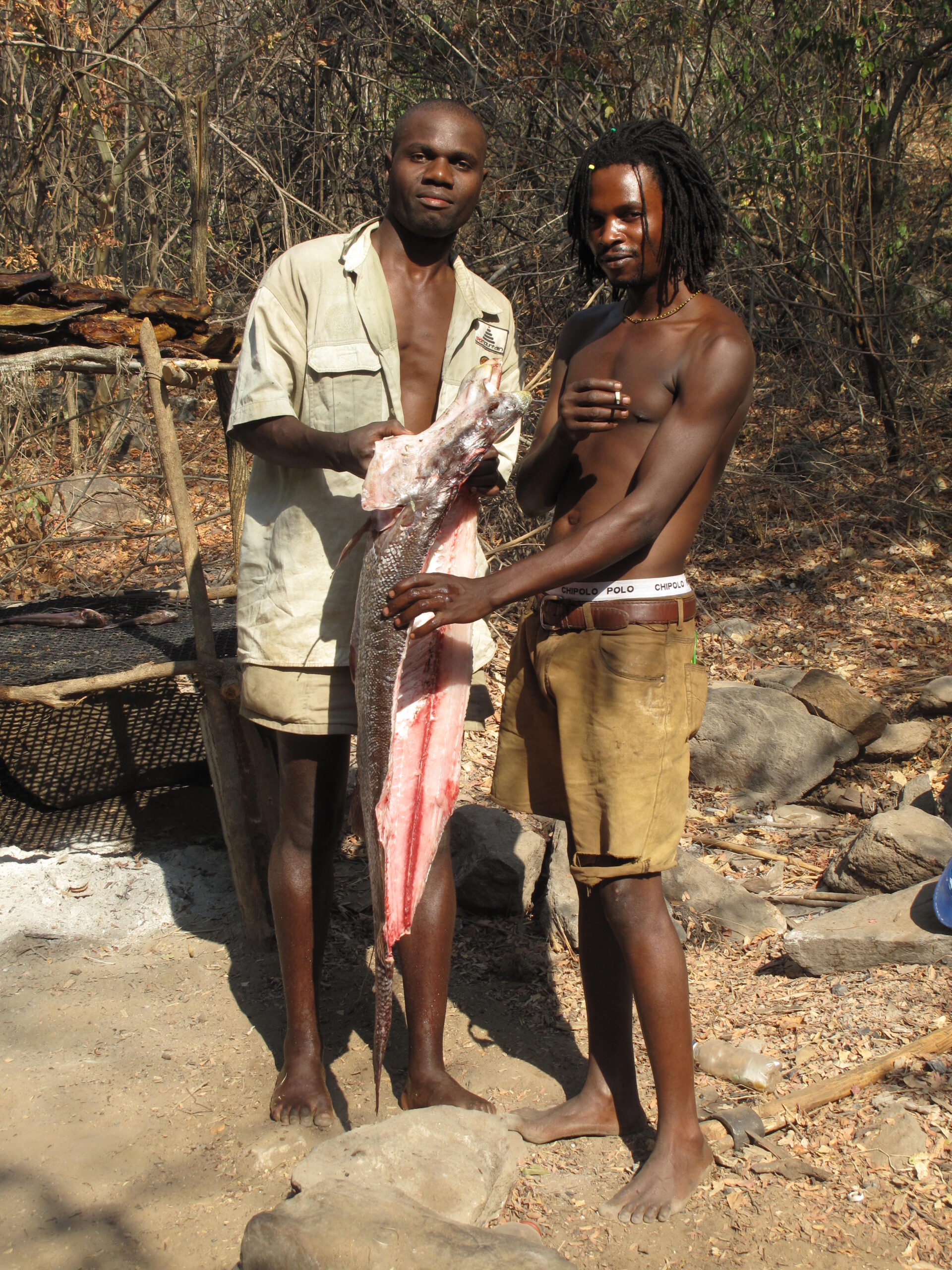
The Zambians assured us that although they never, ever went into Zimbabwe under any circumstances, they knew with absolute certainty that inland from this point was no better than on the river. They said that not one but many mountains would block our way and that our meager water supply would undoubtedly run out fast. But there was a plan – Salisbury fishing camp was only a few hundred meters downstream and they’d run us there and a little beyond, to a point where they would drop us on the far side of the mountain. At that place over the mountain, they said, there was a pass that would lead us inland a few kilometers, where we would find it easier to cross over the half-dozen similar mountains that still lay ahead, and work our way back to the river. They also said we might consider buying some of their fine, fresh wares whilst at Salisbury camp, and would be welcome to pay in either US dollars or cigarettes. Cigarettes would be preferable, of course, but a cash arrangement could be made…. I said that, as it happened, our fish supply was alarmingly low, and quickly loaded my backpack into the makoro.
We obviously had to make two runs over to Zambia and I went first. It was a fairly nerve-wracking border jump, crossing the Zambezi in that beat-up old makoro. It had definitely seen better days and leaked like a sieve – we had to bail as we went. Loaded as our vessel was, it lay very low and water continuously slopped in over the sides. Seated as I was, backside to the base of the boat with no elevation beneath, I could extend my arms in an almost straight line, dangle my hands, and skim the water with my fingertips. There was not much tomfoolery though, I can assure you.
Between bailing with an inadequate plastic receptacle, I enjoyed good, close-up views of the Zimbabwe bank en route to Salisbury camp, and saw all I needed to convince me that it was indeed impossible to walk the shoreline. It was simply sheer rock-face or piles of huge boulders meeting water, for hundreds of meters. It would be madness to attempt it and someone would get killed. A lightly loaded mountaineer could probably do it easily enough, but the Borderline walkers were certainly not going to try. Looking up was no more encouraging – the entire mountainside comprised jagged rock and extreme drop-offs.
I guess a decent overview of the mountain helped me to justify our ‘cheating,’ although the truth is that I have never really felt the need to justify anything on Borderline. We take it as it comes, and we do what we can under the circumstances. That mountain, at that point and as far as my eye could see, was truly an insurmountable object for us, and I will always try to avoid danger at all costs.
Prevention is better than cure, as they say. Contrary to what some may believe, neither Jephita nor I are particularly gung-ho. Who are we going to justify our actions to anyway? It is only we who make the rules. And there are few rules pertaining to Borderline – simply that we walk around the country, sticking to the borderline as closely as possible. Crossing rivers by boat has obviously always been on the agenda, and that morning, as I was paddled down to Salisbury camp, I added ‘insurmountable objects may be rounded by boat’ to the rule list. But only by boat – thus far, we have crossed fourteen rivers, rounded one insurmountable object by boat, and walked the rest of the way. We intend to keep it like that – foot or boat. We won’t get a helicopter ride over a mountain, for example. That would be taking the ‘cheating’ a little too far and actually cause it to become cheating.
Raymond and Rasricky dropped me off at Salisbury camp and introduced me to a few of their fellow fishermen before returning for Jephita. There were only half a dozen guys in camp, but I was told that it was occupied by up to twenty fishermen at any one time. Some were always out fishing, day or night, and some were away at the market, about twenty kilometers inland, over the mountains. I arrived soon after a couple of makoros had come in from the night’s work, and the catch was being cleaned. One fellow had caught an enormous Cornish jack, and I was fortunate enough to get a picture of it. Almost as long as the man himself, I’m sure it would have ranked high on the record list. Salisbury camp comprised basically nothing – a rough and ready grass shelter, some drying racks, a few blankets, and a couple of bags of grain. That’s it. Isn’t it amazing to consider that this is all that up to twenty men need to survive? Don’t get me wrong and assume I’m suggesting these men are merely surviving – I believe they do pretty well in the fishing business, by African standards, that is. They were a content and cheerful bunch, and I was made to feel most welcome.
It was not long before the makoro-bearing Jephita rounded a kink in the river (created by the dreaded mountain), and popped into view. Still low in the water but not as low as on the first run. It was value entertainment for the guys on shore when the intrepid boatmen ran aground on a large rock, in midstream. Then Raymond hopped out onto the rock, just ankle-deep in water, and pushed the makoro off. For a minute he looked as if he was walking on water. Jephita looked as if he was walking on hot coals. By the time the makoro reached shore, Jephita looked as if he’d done three seconds with Mike Tyson and probably would have preferred that to what he’d just endured. I think the surprise of reaching land safely was just too much and placed him in a kind of daze. On a more serious note, we all remember the Umi boat disaster and I respect Jephita for climbing back into any boat, let alone that makoro. It must have taken courage.
We spent only an hour at Salisbury camp for we could not afford to stay longer, but a splendid time was had by all. I believe it was actually a memorable experience for both parties and I like to think those Zambian fishermen discuss our visit sometimes.
There we were, Zimbabweans and Zambians, bridging the divide in a world where nobody else ever ventures. Not anyone from the Zimbabwe side anyway, with the exception of the odd thrill-seeker like Andries Scholtz. Andries and a friend actually crash-landed a micro-light in the gorge at some stage! The truth is nobody goes into the gorge on foot on the Zimbabwe side, and one needn’t be an SAS tracker to figure that one out. The Zambian fishermen own the gorge, on both sides – there’s actually a major Zambian makoro manufacturing industry operating on the Zimbabwe bank!
All too soon it was time to depart Salisbury camp. We had taken tea together, gnawed some dried fish, and engaged in a bit of good-natured bargaining which involved cigarettes, dollars, and fish (in that order), and everyone was well satisfied. Just as we were about to load up and head out, a discussion began amongst the Zambians regarding a name change for Salisbury camp, in honor of our visit. I was horrified and said as much. I told them that Salisbury was a most suitable title – strong, with much meaning and history behind it. I didn’t have to do much persuading – those guys actually like their camp’s name. When I asked them how the camp came to be named Salisbury, they were rather vague. Regardless, the name lives on, albeit as the title of a little hut in the Kariba Gorge wilderness. That knowledge makes me glad.
The Zambians dropped us off on a sandbar on the far side of the mountain. I guess in total we ‘cheated’ about a kilometer in a straight line, maybe a little more. But I don’t have to start explaining and justifying, do I? We’ve been over all that, right? In any case, it was well worth it – for a couple of reasons, but mainly because we would never have visited Salisbury camp had we not ‘cheated’.
A short while later, Jephita and I headed off on an elephant path that ran along the base of a fairly insignificant prominence, following the course of a tiny mountain chikowa (rivulet). The plan was to walk up the valley for three or four kilometers to where the Zambians said the tamer terrain was, and then hop over a few mountains and work our way back to the river. The Zambians had assured us that the further downstream we went, the easier the going would get, and we’d be able to walk the final section of the gorge on the river. But first, we would have to get over some mountains which would be impossible to negotiate anywhere near the Zambezi. I had taken a look at the closest of these mountains and had to concur.
As it often happens, things went fairly smoothly for a while, but then it was all suddenly uphill, in every sense imaginable. I don’t know where that little chikowa went, but we didn’t go with it, soon finding ourselves in the thick of the mountains. After only a brief spell in those mountains, I could have honestly said (if I had been capable of speech), that I have never been so physically tested in my life. The terrain was as brutal as any I have ever encountered, and I have hunted in the Mashambanzhou mountains and the escarpment. Bearing in mind, of course, that I wasn’t lugging 30 kilograms around whilst hunting in the Mashambanzhou! And yes, that day in Kariba Gorge it was 30 kilograms, at least, maybe a little more, to begin with, that is, until we made inroads into our water supply, which didn’t take long. We were carrying as much weight when we set out that morning as on any day of the walk, because of the additional water – fourteen liters instead of the usual four or five. That equates to five kilograms more per man, and it told. We have endured some heavily loaded periods, but never in terrain remotely like Kariba Gorge. Anyway, we were soon carrying less than 30 kilograms, for we glugged that water down as fast as it seeped out. We had no choice – added to the extreme terrain, it was one of the hottest days of the year and our throats were constantly parched. Ten liters became nine as we descended yet another rock-strewn mountainside, plodded across the valley below, and began climbing again.
We continued moving away from the river but angled our course downstream – the strategy we had decided upon when we lost the Zambians’ ‘pass’. Constantly scouring the horizons for the tamer country the Zambians had assured us was there, we never saw anything that resembled tame, though we penetrated five or six kilometers into the mountains. That is from the river in a straight line, bearing in mind that our route was as far removed from straight as it could possibly be. After a short midday break (we were too tired to eat but probably drank more water than necessary), we changed tack and began to work our way back towards the Zambezi. We had left it too late and knew we were in trouble – only a few liters of hot water remained in our containers and we were at least six hours from the river.
And the country was so dry–the few sand streams we came across promised not to yield a drop. Quite ironic really–so little so close, yet so far from so much.
By late afternoon we were in dire straits, with a liter of water left and still hours from the river. We were walking down a wending watercourse that could possibly be classified as a river, but it was as dry as a bone. Thirst is agonizing and I was becoming desperate. At every bend in the river, I pointed to the low spot and silently asked the question of Jephita. Each time he mournfully shook his head and we trudged off through the sand again. We were conserving the final liter for when we really needed it, and it tormented me each step, as it sloshed about in a side-pocket of my backpack. Never in my life have I needed water as badly as that day.
Jephita eventually saved us, at sundown, still several kilometers from the Zambezi. Rounding yet another bend, we came upon a cluster of rocks in the riverbed. Jephita spotted a couple of bees hovering about and zoned in with alacrity. The water was in a tiny depression beside a rock, and soon it was oozing into the hole that Jephita had scooped with his hands in frantic seconds. Dirty and fetid as it was, we knew it would soon clear, and we didn’t care anyway. What a godsend that little waterhole was. I know that if we hadn’t come across it, we would have continued down the riverbed until we found either another source, or reached the Zambezi, no matter what time that may have been. Nocturnal beasties are a laughable threat when one is thirsty.
That evening we celebrated in style, by drinking more than our fill many times, eating more than we could, and dawdling for as long as we wanted under the shower. The shower, you ask? Yes – we have a portable camp shower. It only releases a pathetic trickle, but holds 20 liters, and if one stands under it long enough it is possible to come clean. That night, we filled our shower to capacity and took turns to spend lengthy sessions beneath it. We may not have come totally clean as it had been a particularly dirty day, but the feeling of the water on our bodies was exquisite. After overloading on water, both inside and out, we slept like the dead.
Although I was well used to walking with a heavy pack by that stage, the next morning each and every muscle in my body ached. And though I had slept soundly all night, I was still worn out. The mountains and the sun had certainly taken their toll, and it wasn’t yet over by any means.
We started off the day by continuing down the riverbed, but after finding more water and filling our containers to the brim, we decided to break from the river and head back into the mountains. Sounds crazy, but the fact is that the erratic course of that sand river was causing us to cover double the distance, and it was actually taking us backward, strange as that may seem. Probably the main reason we made the decision was that the further down the Zambezi we got before reaching it, the better. Then, we would have a less hostile shoreline to deal with. The mountains were hard, but at least they weren’t overly dangerous. We needed to progress as far as we could before moving down to the river, lest we be forced to pull out again. And so we picked up where we had left off the previous day, before thirst had driven us into the riverbed – tacking up, over and down, working an east, north-easterly direction, drawing ever closer to the river but not reaching it. The trend was a couple of comparatively low-lying ‘hill’ ranges, followed by a towering mountain range, and so on and so forth. The important factors were that we were progressing down the gorge and that we had no fear of running out of water – the river was now within reach, three then two ranges from us.
We had seen no game since we entered the gorge, but we did that day. Whilst sliding down into a particular valley, Jephita hissed and I came to an immediate halt. We had seen a lone male lion track the day before, and I’d had lion on my mind ever since. But it was only a group of dagga boys that Jephita had espied. Now there was confusion – Jephita was pointing out a Cape buffalo bull that was in the open, and I was busy trying to take a picture of another that was hidden behind the brush. I never even saw the bull in the open, until all seven bulls broke simultaneously a few seconds later, blundering off through the undergrowth. At least I got a couple of hastily taken photos of two of the dagga boys as they made off. They were the only photos we got of any animals in Kariba Gorge.
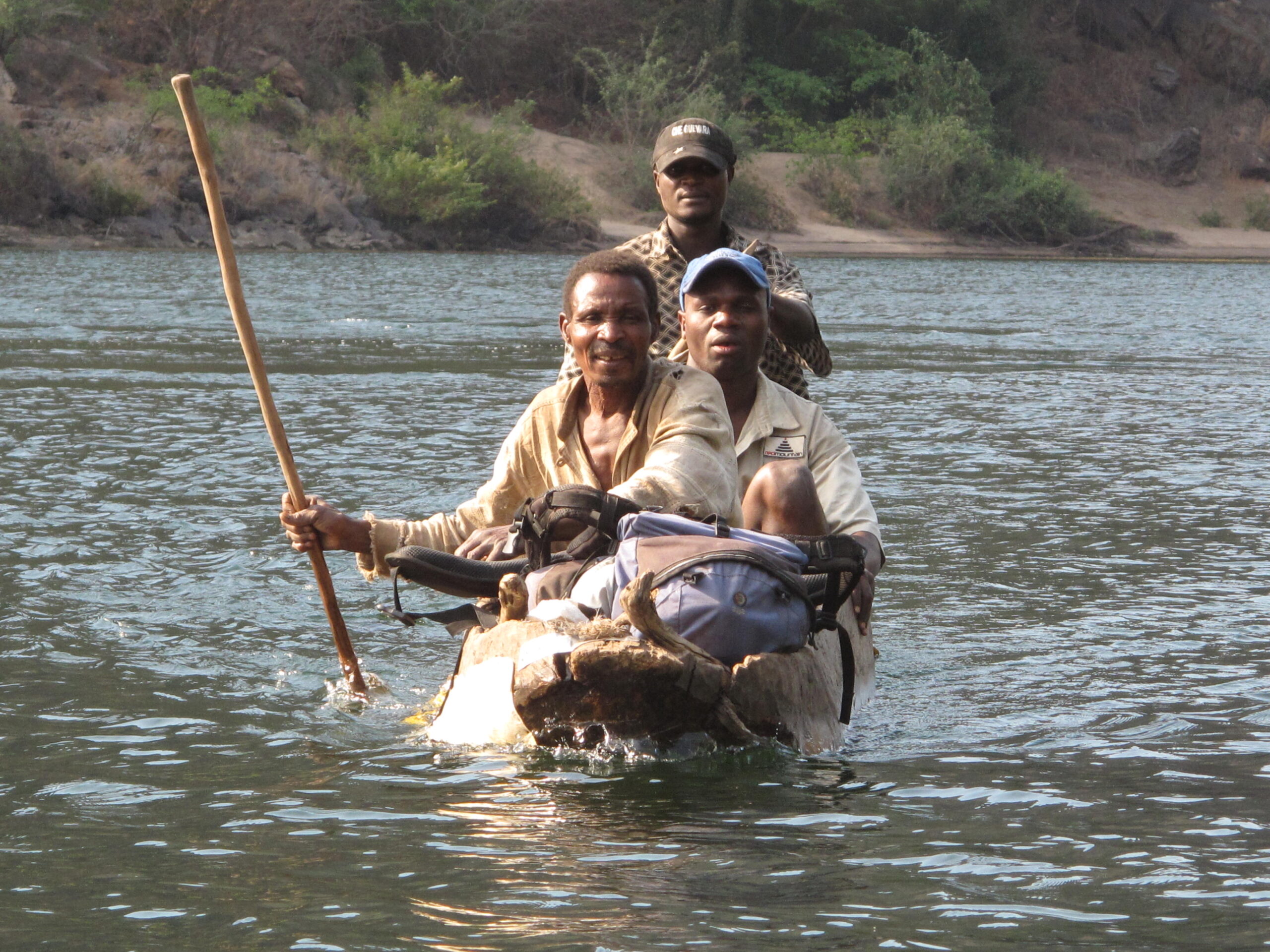
Naturally, we were treated to some fantastic spectacles during our time in the gorge, but there is one that will always remain indelibly imprinted in my mind. I have a decent photograph of it, but the one in my mind is far better, as is most often the case. We were on the summit of one of the highest mountains we had climbed, not far from the river, looking out over the Zambian mountains, the peaks of which were level with us. Between us and those mountains were only lesser ranges and, of course, the void which the Zambezi River runs through. Drained as we were, we spent a few minutes enjoying the exhilarating view.
At that moment, I truly felt on top of the world.
We finally reached the river at midday and flopped down beside it gratefully, totally trashed by the mountains on consecutive days. We did not remain flopped for too long, however – we were on the move, and we needed to keep moving. We knew we couldn’t be too far from the gorge’s end, maybe six or seven kilometers, and we attacked that shoreline with gusto. It was no easier than anything we had so far experienced, but it was doable, and we did it up until the last mountain, which barred our way just as effectively as the first one had. But this mountain was child’s play after what we had encountered and dealt with, and we simply walked up a gulley a short distance and gave it the same treatment as the last stretch of shoreline – attacking from an outrageous angle. It capitulated fast, and soon, we were on the summit looking down over the flat Zambezi valley. That valley floor looked quite strange in a way, kind of out of place. Looking forward and then looking back put everything in good perspective. We only spent a minute or two trying to put things in perspective because the sun had set, and it was already too dark to take decent pictures. We still had to get down the mountainette and then cover a couple of kilometers to Nyamumba Parks sub-station. After losing our way a couple of times and dodging what seemed like many elephants, we walked into Nyamumba after 8 p.m. that night.
The Rangers based there were understandably twitchy when we suddenly materialized from the darkness, and they approached us armed to the teeth. We spent some time explaining who we were and what we were doing from a distance, and eventually, their trigger fingers became less itchy. Our permit from the director general always does the trick, and soon we were telling the tale of Borderline yet again to yet another attentive audience by a slow-burning hardwood fire, sipping strong, sweet tea from our battered tin mugs beneath a clear, star-strewn African sky.
I fell into a deep sleep there by the fire, on the flat rock I was seated upon, my head sagging forward onto my chest, my arms hugging my tired legs together. It may have been two minutes or two hours before Jephita shook my shoulder gently. Ever so slowly I came back from the rugged, rock-strewn mountainside where I had been only seconds before. ‘Handei boss, handei to wata. Pane basa mangwana’ ‘Let’s go boss, let’s go and sleep. There is work to do tomorrow.’
It took us three full days to walk Kariba Gorge and it is only twenty-one kilometers long, minus one kilometer for the makoro ride. That is the worst average we have thus far clocked up on the Borderline Walk for a three-day period, by far.
Of course, we did actually walk further than twenty kilometers (probably thirty), by cutting inland and zigzagging about in the mountains, but still, the pace was well below average. Remember that we were on the move from dawn to dusk, with only the briefest of breaks at midday, usually about an hour. Let’s put it this way – it took us thirty hours to cover thirty kilometers – one kilometer per hour. That pace is indicative of what it is like inside the gorge, as are our photos, of course. Some folk in Kariba thought we were foolish to walk the gorge when there is a perfectly good (and flat) dirt road that runs from Charara (twenty kilometers out of Kariba on the main tar road) directly to Nyamumba sub-station. Parks rangers use the road often and it takes them less than a day to reach Nyamumba. Certain people may think me foolish a second time, but I know what I’d do if I were to repeat that particular leg. There is no Salisbury camp on that boring road from Charara…

